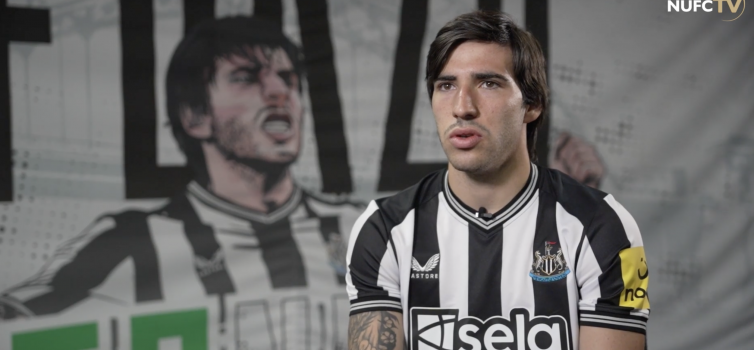Should Newcastle have known about Tonali’s gambling addiction?
Articles / /

Sandro Tonali: Joined Newcastle from AC Milan for £55m in July 2023
Written by Simon Austin — April 1, 2024
With Sandro Tonali facing a further ban from the Football Association for breaching gambling rules, one prevalent argument on both mainstream and social media is that Newcastle United failed to do their due diligence on the £55m transfer.
However, what these articles and posts fail to explain is exactly what the club should have done. So that's what we asked Neil Whitbread, a former Scotland Yard Detective who has helped a number of elite clubs do due diligence on transfers.
Whitbread is Investigations Manager for FACT, a London-headquartered firm that works with governments, multi-nationals, law firms and football clubs on investigations and intelligence.
First, a quick recap on the Tonali story. The midfielder joined Newcastle from AC Milan in July 2023, but played only 12 games before being banned for 10 months by the Italian Football Federation in October for breaching betting rules.
As part of this sanction, Tonali also agreed to an eight-month "therapeutic plan" to help "recovery from gambling addiction". Last week, the Football Association charged the 23-year-old with misconduct for placing 50 bets on matches between August 12th and October 12th last year. That could potentially lead to a further ban.
So should the Magpies have known about the player’s addiction before committing such a large fee for his services?
Whitbread told TGG: “It would have been extremely difficult for Newcastle to have found out about Tonali’s gambling addiction or any breaches of gambling rules. The old days of players going into betting shops and being recognised are long gone.
“They can do everything on their phones. To set up an account with a bookmaker, all you need are your bank details and an email address. That information remains private between you and the bookie. Who else is going to know?
“You might identify an email address through research, but you can't access a private email account legally.

Watch Neil Whitbread at the Scouting & Recruitment Webinar. In total there are SEVEN presentations:
- Victor Orta: Methodology & resources in football recruitment.
- Dave Webb: Considering character in scouting & recruitment.
- Stevie Grieve: Integrating analytics in recruitment strategy.
- Neil Whitbread: Performing due diligence in recruitment.
- Nick Hammond, Ben Stevens & Ben Knapper: Squad building & managing pathways.
- Sam Goldberg: Building a data-driven culture.
- Tom Goodall: End-to-end scouting & recruitment workflows.
To find out more and to buy the webinar, click below.
"Hacking into a phone number or private email is a criminal matter and no reputable business or football club should be associated with that kind of nefarious activity.
“For those people saying that Newcastle failed to do their due diligence, I’d say It’s easy to create soundbites from the safety of your keyboard, without knowing all the facts or the processes that were undertaken.”
Whitbread would instead advocate "thorough and bespoke intelligence research”.

"I would be looking at who to speak to within the player’s network to build a picture of what he’s about" Neil Whitbread
“We have contacts all over the world and I would be looking at who to speak to within the player’s network to build a picture of what he’s about,” Whitbread said.
“This might be a former team-mate, because people talk in dressing rooms, as they do in any other workplace. There are a lot of bespoke databases and resources we can utilise to build a picture about someone's lifestyle, including financial stability."
This could include looking at sources like the Land Registry, to see if someone has remortgaged or defaulted on mortgage payments, or running credit checks and finding out whether they have other civil debts.
Whitbread added: “It’s all about building up a jigsaw of information and creating context. We can go onto the dark web, where you might be able to see a list of email addresses or names for a bookmaker if there has been a data breach, for example. You need specialist software to be able to do that and to also know how to do it.”
As part of his job, Whitbread sometimes does screening interviews for high net worth individuals before they join corporations. This doesn’t really exist in football though, not least because clubs are not meant to speak to prospective signings without the knowledge or approval of their current employer.
Another option could be to request a download check on a prospective signing's mobile phone, but, in the words of Whitbread, "how many people would actually agree to that? Maybe no-one.”
Clauses in contracts could also offer protection. Almost all player contracts contain gross misconduct and disrepute clauses which outline behaviours that could lead to termination of employment.
The Premier League has a standard-form contract whereby “gross misconduct” broadly covers actions such as theft or fraud, anti-doping related offences, incapacity related to drugs or alcohol and a catch-all provision covering equally “serious offences” and persistent breaches of the terms of the contract.
Betting related offences are not strictly defined as gross misconduct. However, unilateral termination of a contract is regarded as a last resort and is likely to result in a protracted legal battle.
Also, would it really make sense for Newcastle to terminate the contract of a player who is only 23 and who had signed a five-year deal? Not really.
Furthermore, AC Milan have vehemently denied any knowledge of Tonali's gambling habits and it would be extremely difficult for Newcastle to substantiate claims otherwise, making any claim for compensation from his former club a seeming no-go.




-1.png)





